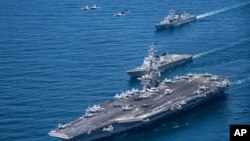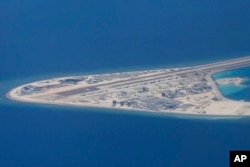There has been no policy change with regard to U.S. Navy freedom of navigation operations under the administration of President Donald Trump, U.S. Pacific Fleet Commander Admiral Scott Swift said on Monday.
Under the previous administration, the U.S. Navy conducted such voyages through the South China Sea — most of which is claimed by China — angering Beijing. But none has been conducted in the region under the Trump administration.
The New York Times reported last week that a U.S. Pacific Command request in March to sail near the disputed Scarborough Shoal, a prime fishing ground that China seized in 2012, was rejected by top Pentagon officials.
Navy requests turned down
Two other requests by the Navy in February were also turned down, it said.
Some saw this as an indication that the United States wanted to avoid antagonizing China while waiting to see how far it would go in helping to press North Korea to give up its ballistic missile and nuclear programs.
“There is nothing that has significantly changed in the last two or three months,” Admiral Scott Swift told reporters in Singapore, referring to the U.S. Navy excursions it says it conducts to ensure freedom of navigation.
“We just present the opportunities when we have a ship in the area and there's an area of interest ... They are either taken advantage of or they're not,” he said.
China's claims challenged
China's extensive claims to the South China Sea, which sees about $5 trillion in ship-borne trade pass every year, are challenged by Brunei, Malaysia, the Philippines, and Vietnam, as well as Taiwan.
The United States has criticized China's construction of man-made islands and build-up of military facilities in the sea, and expressed concern they could be used to restrict free movement.
Late last month, top U.S. commander in the Asia-Pacific region, Admiral Harry Harris, said the United States would likely carry out freedom of navigation operations in the South China Sea soon, without offering details.
South China Sea situation
Swift said there has been no change in the importance the United States placed on the South China Sea issue.
“We are on track to conduct over 900 ship days of operations this year in the South China Sea,” he said.
On China's recent unveiling of a domestically built aircraft carrier, Swift said: “If you have a global economy, I think you need a global navy to look after that economy.”
“If they think that they need carriers to support their maritime strategy, then I am not concerned about it,” he said.













